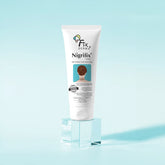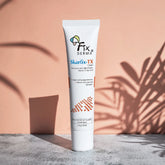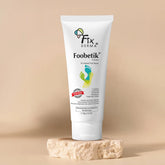The Science Behind Hydration: How Moisturizers Keep Your Skin Happy and Healthy

Tables of Content
- Understanding Skin Hydration: The Foundation of Healthy Skin
- How Moisturizers Work: The Science Behind the Magic
- Hydration vs. Moisturization: Is There a Difference?
- The Best Ingredients for Skin Hydration
- How Moisturizers Improve Skin Health
- Hydrating Skincare Tips: How to Keep Skin Hydrated
- Conclusion: The Key to Happy, Healthy Skin
- Frequently Asked Questions (FAQs)
Healthy, glowing skin begins with proper hydration, and moisturizers are your skin’s best friend when it comes to locking in moisture. But what is the science of skin hydration? How do moisturizers work, and why are they essential for your skin's well-being? Let's dive into the fascinating world of hydration and how moisturizers improve skin health.
Understanding Skin Hydration: The Foundation of Healthy Skin
Your skin is the largest organ of your body, and like all organs, it needs hydration to function properly. The outermost layer of the skin, known as the stratum corneum, acts as a barrier to protect your body from external pollutants and retain moisture. However, environmental factors like sun exposure, pollution, and harsh cleansers can strip away natural oils, causing your skin to lose moisture. This is where the science of skin hydration comes into play.
The body naturally produces oils and lipids to keep the skin hydrated, but sometimes this is not enough. How moisturizers work is by reinforcing the skin’s natural barrier and preventing water loss, ensuring your skin remains hydrated, supple, and healthy.
How Moisturizers Work: The Science Behind the Magic

At their core, moisturizers are formulated with ingredients that help attract and lock moisture into the skin. There are three types of key ingredients in moisturizers that are vital to maintaining optimal hydration:
- Humectants – These draw moisture from the air into the skin.
- Emollients – These help fill in gaps between skin cells, smoothing and softening the skin.
- Occlusives – These create a physical barrier on the surface of the skin to prevent moisture loss.
This trio works together to maintain the moisture balance of your skin. The science of skin hydration reveals that using the right combination of these ingredients helps prevent dryness, flakiness, and irritation, leading to moisturizers for glowing skin.
Hydration vs. Moisturization: Is There a Difference?
It’s easy to confuse hydration vs. moisturization, but they are not the same. Hydration refers to the water content in the skin, while moisturization is about trapping that water to prevent it from evaporating. In other words, hydration adds water to the skin, and moisturization ensures it stays there. Understanding the difference helps you select the best product based on your skin type and specific needs. How to keep skin hydrated involves using products that offer both hydration and moisturization, as both are essential for moisturizers for healthy skin.
The Best Ingredients for Skin Hydration

Knowing the top hydrating ingredients for your skin can help you choose the best products for optimal hydration. Some of the best ingredients for skin hydration include:
- Hyaluronic Acid – Known for its ability to hold up to 1,000 times its weight in water, hyaluronic acid is a powerhouse for hydration.
- Glycerin – A humectant that draws moisture into the skin and keeps it plump and soft.
- Ceramides – Essential lipids that maintain the skin’s protective barrier.
- Squalane – An emollient that mimics the skin’s natural oils, offering long-lasting hydration without being greasy.
- Aloe Vera – A soothing and hydrating botanical ingredient that calms irritation while boosting moisture.
These ingredients work synergistically to keep your skin healthy and hydrated. By incorporating products rich in these ingredients into your routine, you can experience the full benefits of moisturizing daily.
How Moisturizers Improve Skin Health
Consistent use of moisturizers does more than just make your skin feel soft; it significantly impacts your skin’s overall health. How moisturizers improve skin health is by replenishing lost moisture, strengthening the skin barrier, and improving texture. Regular hydration can also help slow down the signs of aging, reduce irritation, and enhance the effectiveness of other skincare products.
Using moisturizers daily ensures your skin is resilient against environmental stressors. Moisturizers for glowing skin not only maintain hydration but also improve skin tone and texture, leaving you with a luminous complexion.
Product Recommendations
Fixderma Durave Acne Control & Oil-Free Face Moisturizer is a nourishing and soothing moisturizer that is lightweight & non-greasy. This multitasking product tackles breakouts, controls oil production, and nourishes the skin – all in one!
Fixderma Durave Barrier Repair Face Cream is scientifically formulated to restore and protect the skin’s natural barrier. The cream contains a blend of ceramides and probiotics that are essential components of the skin's barrier, helping to replenish and strengthen it.
Fixderma Durave Moisture Protect Deep Hydration Face Moisturizer offers long-lasting hydration and protection for your skin. This rich yet non-greasy formula is designed to deeply nourish and restore the skin's natural barrier, ensuring it stays supple and resilient throughout the day.
Fixderma Durave Radiance & Oil-Free Face Moisturizer is a lightweight formula designed to deliver a radiant, matte complexion. The oil-free formula ensures that your skin stays hydrated without excess shine or oily feeling.
Hydrating Skincare Tips: How to Keep Skin Hydrated

Looking for ways to keep your skin hydrated throughout the day? Here are some simple yet effective hydrating skincare tips:
- Drink Plenty of Water – Hydration starts from within, so make sure you’re drinking enough water daily.
- Use a Humidifier – Especially during the winter months, when the air is dry, a humidifier can help maintain moisture in the air.
- Apply Moisturizer to Damp Skin – Lock in extra moisture by applying your moisturizer right after cleansing while your skin is still slightly damp.
- Choose the Right Moisturizer – Look for products rich in the best ingredients for skin hydration, such as hyaluronic acid or glycerin.
- Exfoliate Regularly – Gentle exfoliation helps remove dead skin cells that may be blocking your moisturizer from absorbing fully.
Incorporating these tips into your skincare routine ensures that you maximize the benefits of moisturizing daily.
Conclusion: The Key to Happy, Healthy Skin
When it comes to skincare, hydration is the key to maintaining a glowing and youthful complexion. The science of skin hydration teaches us that a proper moisturizer, loaded with hydrating ingredients, is vital in achieving healthy skin. Understanding how moisturizers work empowers you to make informed choices about your skincare routine. So, make hydration a priority, and enjoy the long-lasting benefits of smooth, supple, and radiant skin.
Frequently Asked Questions (FAQs)
-
How do moisturizers actually work to keep my skin hydrated?
Moisturizers work by creating a barrier on the skin that locks in moisture while also replenishing hydration with ingredients like hyaluronic acid and glycerin. They help attract water to the skin and prevent it from evaporating, keeping your skin smooth, soft, and hydrated. -
What are the best ingredients to look for in a moisturizer for dry skin?
For dry skin, look for moisturizers that contain hydrating ingredients like hyaluronic acid, glycerin, ceramides, and squalane. These ingredients help draw moisture into the skin, restore the skin barrier, and keep the skin hydrated all day. -
What’s the difference between hydrating and moisturizing my skin?
Hydrating refers to increasing the water content in your skin, while moisturizing is about sealing in that hydration to prevent water loss. Hydration adds moisture, and moisturization locks it in, ensuring your skin stays plump and healthy.








